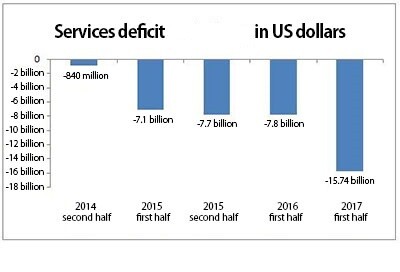hankyoreh
Links to other country sites 다른 나라 사이트 링크
THAAD deployment causes South Korea’s biggest ever services deficit with China
South Korea recorded its highest-ever deficit in services amid conflicts with China over the deployment of a THAAD missile defense system on the Korean Peninsula. The Bank of Korea (BOK) previously predicted the South Korea-China conflict would reduce the 2017 economic growth rate by around 0.3 percentage points.
A provisional report on the international balance of payments for June published on Aug. 3 by BOK showed a negative balance of US$15.74 billion in services for January to June 2017. The deficit was more than double the US$7.8 billion recorded for the same period in 2016 – a historic high on a half-yearly basis. The previous highest deficit was recorded in the second half of 2016 at US$9.78 billion. The services balance refers to the difference between payments made and received through service transactions with other countries, including transportation, travel, and patent usage expenses.

The Chinese government’s ban on group tours of South Korea in response to the THAAD deployment played a large part in the services deficit increase. According to Office of Immigration figures, the number of Chinese nationals entering South Korea for the month of June stood at 255,000 – down 66.4% from the same month in 2016. The number of Chinese entries was down by a similar scale in May.
“While overseas travel [by South Koreans] has been on the rise steadily due to increasing domestic income and other factors, travel to South Korea by foreigners has decreased sharply, resulting in a growing deficit in the balance of payments for services,” explained BOK economic statistics bureau director Jeong Gyu-il in an Aug. 3 briefing.
“The number of arrivals in South Korea had risen sharply since 2012, but has declined substantially since the Chinese government’s measure last March banning group tours of South Korea, and visits by residents of Japan, the US, and the Philippines have also been decreasing,” Jeong said.
In an economic forecast published on July 13, BOK predicted the effects of THAAD would reduce the real economic growth rate for 2017 by around 0.3 percentage points. This would mean the loss of around 460–470 billion won (US$408–417 million) in value-added as a result of the conflict between Seoul and Beijing.
“An analysis of Chinese tourists before the group tourism ban shows around 65% of them to have been visiting through group tours. The current decline in tourist numbers matches that precisely,” a BOK source said.
“Since Chinese tourists tend to spend more than tourists from other countries when they travel, the direct and indirect effects on the domestic economy are somewhat larger,” the source explained.
The current balance, which includes the balances in both services and goods, was in the positive column for the first half of the year at US$36.27 billion. For June, the surplus stood at US$7.01 billion, down substantially from US$12.9 billion one year before. BOK explained that this was the combined result of the growing services deficit and increased overseas machinery imports amid the economic recovery. The surplus has continued for 64 straight months. At the same time, foreign investment in the domestic securities market was also found to have increased for the seven straight months since Dec. 2016. At US$23.13 billion, securities investment by foreigners during the first half of the year was the third highest ever on a half-yearly basis.
“There’s been a continued net inflow in stock and bond funds due to anticipation of improved management performance by domestic companies and the favorable national credit rating,” said Jeong.
The increase in domestic investment by foreign investors continued even as the difference in interest rates between South Korea and the US has almost disappeared after the US Federal Reserve raised its policy interest rate twice this year alone in March and June.
By Kim Kyung-rok, staff reporter
Please direct questions or comments to [english@hani.co.kr]

Editorial・opinion
![[Column] Season 2 of special prosecutor probe may be coming to Korea soon [Column] Season 2 of special prosecutor probe may be coming to Korea soon](https://flexible.img.hani.co.kr/flexible/normal/500/300/imgdb/original/2024/0426/3317141030699447.jpg) [Column] Season 2 of special prosecutor probe may be coming to Korea soon
[Column] Season 2 of special prosecutor probe may be coming to Korea soon![[Column] Park Geun-hye déjà vu in Yoon Suk-yeol [Column] Park Geun-hye déjà vu in Yoon Suk-yeol](https://flexible.img.hani.co.kr/flexible/normal/500/300/imgdb/original/2024/0424/651713945113788.jpg) [Column] Park Geun-hye déjà vu in Yoon Suk-yeol
[Column] Park Geun-hye déjà vu in Yoon Suk-yeol- [Editorial] New weight of N. Korea’s nuclear threats makes dialogue all the more urgent
- [Guest essay] The real reason Korea’s new right wants to dub Rhee a founding father
- [Column] ‘Choson’: Is it time we start referring to N. Korea in its own terms?
- [Editorial] Japan’s rewriting of history with Korea has gone too far
- [Column] The president’s questionable capacity for dialogue
- [Column] Are chaebol firms just pizza pies for families to divvy up as they please?
- [Column] Has Korea, too, crossed the Rubicon on China?
- [Correspondent’s column] In Japan’s alliance with US, echoes of its past alliances with UK
Most viewed articles
- 1Samsung subcontractor worker commits suicide from work stress
- 2‘We must say no’: Seoul defense chief on Korean, USFK involvement in hypothetical Taiwan crisis
- 3[Editorial] Korea’s surprise Q1 growth requires objective assessment, not blind fanfare
- 4Division commander ordered troops to enter raging flood waters before Marine died, survivor says
- 5Is Japan about to snatch control of Line messenger from Korea’s Naver?
- 6No good, very bad game for Korea puts it out of Olympics for first time since 1988
- 7US overtakes China as Korea’s top export market, prompting trade sanction jitters
- 8N. Korean delegation’s trip to Iran shows how Pyongyang is leveraging ties with Moscow
- 9Korea’s 1.3% growth in Q1 signals ‘textbook’ return to growth, says government
- 10[Column] Season 2 of special prosecutor probe may be coming to Korea soon